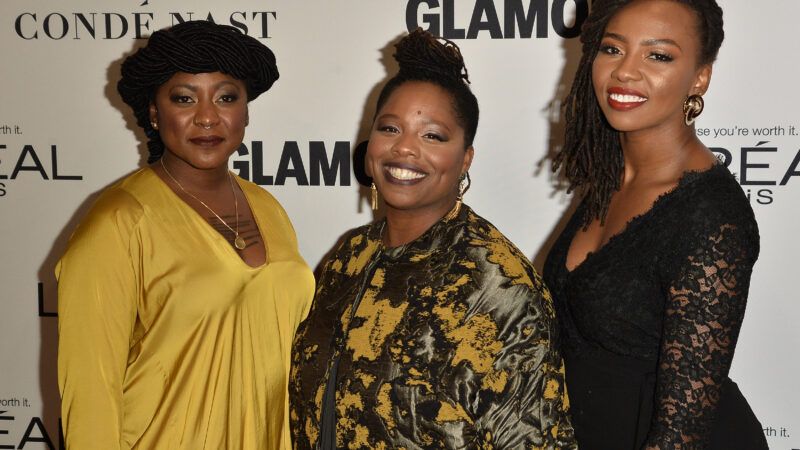Who's In Charge of Black Lives Matter's Millions of Dollars?
"A giant ghost ship full of treasure drifting in the night with no captain, no discernible crew, and no clear direction."

Black Lives Matter (BLM) was more than just a hashtag—it was an entire movement for racial equality, criminal justice reform, and police accountability. It was also a cultural moment and serious moneymaker: The organization raised some $90 million in 2020 alone.
That year was a banner one for racial justice protests. The summer of 2020 saw the death of George Floyd at the hands of Minneapolis police: In response, millions of people all over the world participated in Black Lives Matter activism. (The cause wasn't—and still isn't—necessarily partisan. Even Republican Sen. Mitt Romney marched.)
That $90 million is an impressive total. But according to multiple media reports, two-thirds of it—$60 million—remain unspent. What was spent, and how it was spent, also raises serious questions. And then there's the biggest mystery of all: Who is currently in charge of BLM? No one, it seems, has any idea. The Black Lives Matter Global Network Foundation is, as far as anyone can tell, leaderless. The founders are no longer involved, and the people they supposedly installed to succeed them never actually took the job.
That's all according to a series of bombshell reports in both left and right media. At the very least, they should give anyone who is considering donating to BLM serious pause.
Listeners with good memories will recall that last year, BLM co-founder Patrisse Cullors came under fire for purchasing several million-dollar homes at the exact time the George Floyd protests were underway.
In a statement, BLM said that all of this was on the up and up: "Patrisse Cullors is the Executive Director of Black Lives Matter Global Network Foundation (BLMGNF). She serves in this role in a volunteer capacity and does not receive a salary or benefits. Patrisse has received a total of $120,000 since the organization's inception in 2013, for duties such as serving as spokesperson and engaging in political education work. Patrisse did not receive any compensation after 2019."
And that very well might be the case. Cullors has many sources of income: book deals, speaking gigs, a media production arrangement. She's a celebrity activist, and that lifestyle can pay. Nevertheless, after the fallout from that story, Cullors resigned as president of BLMGNF.
In May 2021, she announced that her successors would be Makani Themba, chief strategist at Higher Ground Change Strategies, and Monifa Bandele, chief operating officer at Time's Up Foundation.
But just a few months ago, in September, Themba and Bandele released a curious statement: Neither of them had ever assumed the role. They had not been able to "come to an agreement with the acting leadership council" and had ultimately declined the position.
Thanks to everyone for your support. pic.twitter.com/E268EUpVo4
— Makani Themba (@Makani_Themba) September 3, 2021
In a subsequent tweet, Themba clarified that she was never onboarded, did not access BLM's funds, and was generally clueless about how the money was spent.
According to The Washington Examiner, the remaining board members of BLMGNF are Shalomyah Bowers and Raymond Howard. Bowers, "served as the treasurer for multiple activist organizations run by Cullors, including BLM PAC and a Los Angeles-based jail reform group that paid Cullors $20,000 a month and dropped nearly $26,000 for 'meetings' at a luxury Malibu beach resort in 2019."
According to additional reporting done by New York magazine:
In 2019, while working on an ultimately successful ballot initiative, Reform LA Jails collected more than $1.4 million in contributions. More than half was paid out to just four recipients. The group sent more than $270,000 to Bowers's consulting company, as well as some $211,000 to Asha Bandele, a friend of Cullors's who co-wrote her memoir. About $205,000 went to a company Cullors operates with her spouse, Janaya & Patrisse Consulting. And about $86,000 was paid to Trap Heals LLC, an entertainment, clothing, and consulting company started by Damon Turner, the father of Patrisse Cullors's child."
Fundraising ethicists consulted by both the Examiner and New York magazine found the arrangements extremely shady.
"This is grossly irregular and improper for a nonprofit with $60 million in its coffers," Paul Kamenar of the National Legal and Policy Center told The Examiner.
CharityWatch Executive Director Laurie Styron described BLM to New York magazine as a "giant ghost ship full of treasure drifting in the night with no captain, no discernible crew, and no clear direction."
These are damning descriptions of an organization that lead such an important—and well-funded—social movement. BLMGNF has some explaining to do.
